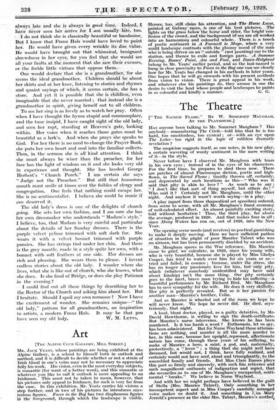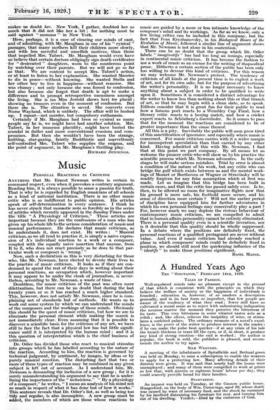The Theatre
[" THE SACRED FLAmE.- BY W. SOMERSET' MAUGIIAAL AT TEE. PLAYHOUSE1 - HAS anyone been talking to Mr. Somerset Matigham ? Has anybody—remembering- The Circk,---told him that. he is too hard, too emotionless, too cynical ; or-with _an eye upon The. Lettertoo rigid in • the logic Of ruthless diainatie revelation ?
The. suspicion' suggests itself, as one notes, in his new:play, a certain wavering of wordy sentiment in the me. re writing
of it—in the style. . .
Never before 'have I observed Mr. Maugham with tears in his own eyes ; instead of in the eyes of his characters.
For the first time, he prepares to shed them now. -There are patches of almost Pineroesque diction, poetic and high- flown, in The Sacred Flame ; timidly thrown off, certainly, and- deprecated by such locutions as this—" Who was it said .that pity, is akin to , love ? 7 As much as to .say : .” I don't like that. sort • of thing myself,. but others .do. Who. said it ? Certainly not Mr. Maugham, until the other night: -And anyhow it wasn't worth saying-iii a play. •
• A. play (apart•froin those rhapsodical 'set speeches) ordered; from scene to scene, with all Mr. Maugham's forest economy
of well-calculated effect. An almost painfully exciting story; told without -hesitation ! Thus, the' third play, far above the average, produced in 1929. And that makes four in all ; since Many Waters has run on, out of 1928, into the New
Year. -
The opening scene needs (and receives) no poetical garnishing Iiiniake it deeply moving. Here we 'have sufficient pathos of situation in -the plight of poor Maurice Tabret who was
an airman, but has been permanently disabled by an accident.
Mr.,Vatighain spares. us the War reference; His Maurice carne to grief,'We calculate, in 1923, since :his young 'wife,
who is very beautiful, because she is played by Miss Gladys
COOper, has. tried to watch over hint for six years or so— tried, and failed, in essence ; because,' Under the stress; She has no longer any passionate 'love • for him,' btit' oiq pity, Which (whatever soniebody" unidentified may haVe • said about kinship) isn't. the 'Same thing. Our pity certainly goes to the inert, brave man trying to hide his Sufferinga beautiful performance, by ME. Richard Bird. • Mr:uMaugliam has to save sympathy for the Wife. He does it very -skilfully. Tier pity is perfectly revealed. But so is her :passion: f6r another man--Maurice'S brother, Colin.
And as Maurice is wheeled out of the room We hope lie will never know. We hope he never died, Mys- teriously, that night. A loud, blunt doctor, played, as a guilty detective, by Mr- David Hawthorne, is willing to sign the ,death certificate- -Rut Maurice's nurse intervenes. She. knows he_ has been murdered. Is it too harsh a. word ? Buthanasia, let us spy, has been administered. But fiir Nurse Wayland those attenua- tions are nothing, and murder is all the more. murdei to her, in- this case, because -her. upright, repressed, .affectionate nature has come, through these years of his suffering, to make of Maurice a hero, a saint, a god, and, maternally; protectively, a " _lover " ; a thing that, she, might well haye -dreamed, but Would not, have fully realized, and certainly Would:not have said, aloud and triumphantly, to the assembled family and friends.. But Miss :Clare kimes Plays this part so firmly and sincerely, with such fine reticence and such magnificent outbursts of indignation and regret, that she reconciles-us to one of Mr. Maugham's unexpected, senti- mental " breaks." We believe in Nurse Wayland.,, And with her we might perhaps have believed in•the guilt -of Stella - (Mrs: Maurice Tabret). Only something 'in- her incompetent aspect and:in. Miss Cooper's carefully. arranged voice makes us doubt - it. And something in Liss Mary -Jerrold's presence as the elder-Mrs. Tabret, Maurice's mother's
makes us doubt her. New York, I gather, doubted her so much that -it- did not like her- a' bit ; for nothing must be said- against " momma " in New York. - - •'
• Here, perhaps, it is a case of clearing our minds of cant, and of admitting, with Mr. Maugham hi one of his " cynical " passages,- that -many- trio-tilers kill their children more slowly, and with- less merciful and unselfish ' motives; than those that impelled 'Mrs. Tabret: • Mr. Maugham would even have us believe that certain doctors obligingly sign death certificates for " desiccated "- daughters, worn -to the -murderous point by watching over their parents. But we will not go so far as- that. We are content to accept 'Mrs. - Tabret's action, or at least to listen to her explanation. She wanted-Maurice to die in peacewithout knowing. She -wanted Stella and her other boy to live in happiness—without remorse. She was clumsy ; not only because she was forced to confession, but also because she forgot that death` is apt to -make a difference and to prompt retrospective uneasiness amongst the living. She- is (as Miss Jerrold shows her) too placid ; showing no tremors even in the moment of confession. But there she is. The - situation is saved. She converts even Nurse Wayland, which is unlikely. The affair will be hushed up. I repeat—not murder, but compulsory euthanasia Certainly if Mr. Maugham had been so cynical as many people say he is, we might have had another solution. Mrs. Tpbret, in her immense placidity, might have buried the Scandal in duller and more conventional evasions and com- promises. But then- she wouldn't have been the strange, knitting, star-gazing, faintly Buddhistic and marvellously self-controlled Mrs. Tabret who supplies the enigma,- and the point of argument, in Mr. Maugham's thrilling play. RICHARD- JENNINGS.











































 Previous page
Previous page